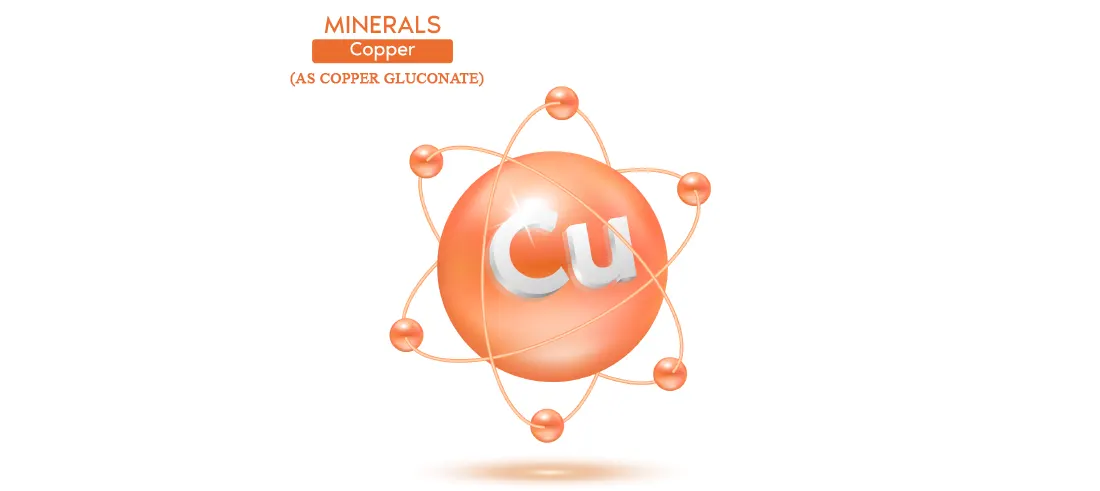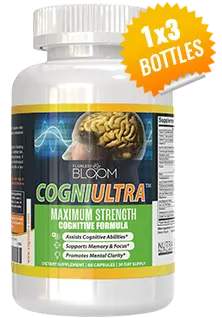What is Copper?
Copper stands as a vital trace mineral that powers countless functions in our bodies. The mineral works tirelessly to help create red blood cells and boost our immune defenses. Your body relies on copper to absorb iron properly and maintain strong cellular health daily.
The mineral drives key enzyme reactions that give our cells the energy they need. Scientists have found that copper shields our cells from harmful oxidative damage effectively.
Notably, copper and brain health are linked, as copper is indispensable for brain function in creating crucial neurotransmitters that shape our thoughts and feelings. This mineral helps our minds process information quickly while supporting both memory and emotional balance.
Why Copper Gluconate is Commonly Used as a Supplement
Healthcare professionals often recommend copper gluconate because our bodies can absorb and use it efficiently. This form dissolves better than copper sulfate or oxide while being gentler on your stomach. Most people tolerate copper gluconate well without experiencing digestive issues or discomfort.
Health-conscious individuals choose copper gluconate to maintain proper copper levels in their systems naturally. The supplement offers a reliable way to support both physical health and mental sharpness. Many people appreciate how copper gluconate provides essential benefits without unwanted effects on their bodies.
Improve Memory, Mood, And Cognition With Proper Copper Intake
The Role of Copper in Brain Function
Copper plays several critical roles in keeping our brains working at their best. Let’s explore the key ways this mineral supports our cognitive health:
1. Essential for Neurotransmitter Synthesis and Signaling
- Your brain depends on copper to produce vital chemicals like dopamine and serotonin.
- These neurotransmitters control everything from your daily mood to your ability to learn.
- Imbalances in copper and brain health have been linked to neurological disorders such as depression and schizophrenia.
2. Supports Brain Cell Communication and Neuroplasticity
- Copper helps strengthen the connections between brain cells for better learning abilities.
- The mineral enables our neurons to form stronger pathways for clearer thinking.
- Research indicates that copper in brain function may prevent cognitive decline.
3. Involvement in Antioxidant Defense to Protect Against Oxidative Stress
- Your brain relies on copper to activate SOD, a powerful defender against cell damage.
- The mineral fights harmful free radicals that could hurt your brain cells daily.
- Maintaining proper copper and brain function may lower the risk of copper in brain disease conditions such as Alzheimer’s.
Copper Gluconate: What Makes It Special?
Copper gluconate is a highly absorbable form of copper, making it an excellent choice for copper and brain health supplements. Unlike inorganic forms, it dissolves efficiently, ensuring better absorption and effective delivery to brain cells.
How It Differs from Other Copper Supplements:
- Copper sulfate – Less bioavailable and may cause stomach discomfort.
- Copper bisglycinate – Also well-absorbed but tends to be more expensive.
- Copper gluconate – Offers a balanced combination of absorption and effectiveness, making it a widely recommended option.
Its superior bioavailability supports key neurological functions, making it a preferred form of copper for maintaining copper and brain function. By choosing copper gluconate, individuals can optimize their copper intake without the common digestive concerns associated with other forms.
Cognitive Benefits of Copper Gluconate
Let’s take a look at some of the benefits of copper for brain:
Memory and Learning: Copper’s Role in Synaptic Plasticity
- Your brain’s ability to form fresh neural pathways depends heavily on copper’s presence. Scientists have discovered that copper enhances the brain’s natural capacity to build new connections.
- Research shows that copper and brain health are closely linked, as copper directly strengthens the communication highways between your brain cells.
- The brain needs copper to maintain its remarkable ability to adapt and learn new things. People who lack enough copper might notice their mental performance and learning abilities decline over time.
Mood Regulation: Influence on Dopamine and Serotonin Levels
- Copper acts as a vital conductor in your brain’s emotional orchestra of neurotransmitters. The mineral works behind the scenes to help your brain produce essential mood-regulating chemicals.
- Your brain relies on copper to transform dopamine into norepinephrine through specialized enzyme processes.
- A steady supply of copper helps your brain maintain emotional balance and mental clarity.
Neuroprotection: Potential to Reduce Cognitive Decline
- Your brain gains powerful protection against aging when copper levels stay within healthy ranges.
- Research indicates that proper copper may lower the risk of copper in brain diseases, such as Alzheimer’s and Parkinson’s.
- The mineral serves as a shield for your brain cells, fighting harmful compounds. Regular copper intake might help preserve your cognitive abilities as you move through life.
Ensuring sufficient copper intake can help maintain cognitive function, mood balance, and neuroprotection—highlighting the long-term benefits of copper for brain health and overall mental well-being. It is also important to consider the best supplements for cognitive decline to further support brain health.
Copper Deficiency and Its Impact on Brain Health
Symptoms of Copper Deficiency Affecting Cognitive Function
When the body lacks sufficient copper, brain function can be significantly affected. Some common cognitive symptoms include:
- Memory and Learning Issues – Your brain struggles to store new information and solve problems when copper runs low.
- Mood Imbalances – Low copper can trigger mood changes, leading to feelings of worry or sadness.
- Slower Cognitive Processing – People with copper deficiency often report feeling mentally foggy and unable to think clearly.
- Increased Oxidative Stress – Your brain becomes more vulnerable to damage when it lacks copper’s protective effects.
Risks Associated with Insufficient Copper Intake
- Chronic deficiency is linked to copper in brain diseases such as Wilson’s disease, which affects copper metabolism.
- Additionally, conditions like Wilson’s disease, which affects how the body metabolizes copper, can cause serious cognitive and motor impairments.
Ensuring a balanced copper intake is essential for maintaining brain health, supporting cognitive function, and reducing the risk of long-term neurological issues.
Optimal Dosage and Safety Considerations
How Much Copper Do You Need for Brain Health?
Your brain needs copper in small amounts to work at its best. Different groups have specific daily copper requirements for optimal health:
- Adults should aim to consume 0.9 mg of copper each day.
- Pregnant women need slightly more copper, with a daily target of 1.0 mg.
- Nursing mothers require the highest amount at 1.3 mg per day.
These carefully measured amounts support brain processes, help create vital brain chemicals, and protect nerve health.
Can You Get Too Much Copper?
Your body maintains a delicate balance when it comes to copper levels. Taking in too much copper can trigger several unwanted responses in your body:
- Your stomach might rebel with problems like feeling sick or experiencing sharp pains.
- Your brain could signal trouble through strong headaches or sudden bouts of dizziness.
- Extra copper might throw off your body’s mineral balance, causing harmful stress to cells.
Scientists have found links between high copper levels and brain diseases over time. Long-term overconsumption may increase the risk of neurodegenerative conditions by disrupting copper and brain function. Finding the right balance helps you gain the benefits of copper for brain health while avoiding any harmful effects.
How to Incorporate Copper Gluconate into Your Diet
Natural Food Sources of Copper
To maintain copper and brain health, include these copper-rich foods in your diet:
- Nuts and seeds – Tree nuts and seeds pack plenty of copper into small servings you can enjoy.
- Shellfish – Ocean creatures like fresh oysters and tender lobster meat deliver copper in forms your body uses well.
- Whole grains – Complex carbohydrates from whole grains bring steady copper to your daily meals.
- Dark chocolate – Dark chocolate offers a pleasant way to boost your copper intake while satisfying sweet cravings.
These food choices support copper and brain function needs and help maintain strong neural connections.
When Supplementation Might Be Necessary
Some people face special challenges in getting enough copper from food alone. People with gut disorders that block nutrient absorption might need extra copper support. Those following strict eating patterns might miss out on key copper sources.
Finding the right mix of foods and supplements can help maintain healthy copper levels, supporting copper and brain function without the risk of excessive intake. Always check with your healthcare professional before starting any copper supplements to ensure safe usage.
Boost Brain Function With Copper Gluconate! Support Memory And Focus
FAQs
Does Copper Help the Brain?
Yes, copper is essential for neurotransmitter synthesis, antioxidant defense, and synaptic plasticity, all of which support brain function.
Is Copper Good for Memory?
Absolutely! Copper plays a key role in synaptic plasticity, allowing neurons to form and strengthen connections, which improves learning and memory.
Is It Safe to Take Copper Every Day?
Yes, in recommended amounts. The RDA for adults is 0.9 mg per day. Excess copper intake should be avoided to prevent toxicity.
Does Copper Increase Dopamine?
Yes, copper is involved in dopamine synthesis, which influences mood, motivation, and cognitive function.
Conclusion
Copper is essential for brain function, supporting memory, mood, and neuroprotection. Copper gluconate, a bioavailable form, helps maintain optimal levels of cognitive well-being. However, balance is crucial—too little may impair brain health, while excess can lead to toxicity.
For optimal copper and brain function, focus on a nutrient-rich diet with foods like nuts, seeds, and leafy greens. Supplementation should be considered only if necessary and under guidance.
Maintaining balanced copper levels supports mental clarity, mood stability, and long-term cognitive health while avoiding risks associated with copper in brain disease imbalances. Prioritizing a healthy intake of this vital mineral may enhance brain function and overall well-being.




